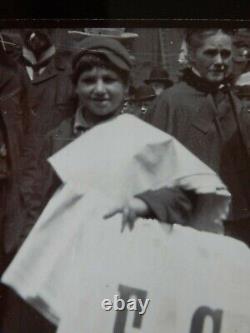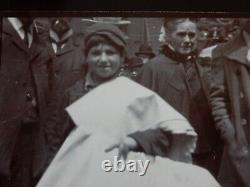Victorian child PAPERBOY PORTRAIT Treaty Berlin 1878 later photograph c 1890










NOT A MODERN COPY NOT A REPRODUCTION. FROM NEWSPAPER ARCHIVES FOR RESEARCH PURPOSES ONLY ie the title and the topic Berlin Treaty. " The discussion as to the origin of the phrase " Peace with Honour'' continues. Several of tbs correspondents who have written to the Tima quota its use by Shakspeare.
" all recaU the following lines from " Coriolanus, " act iii, scene 2: " If it be honour in your wars, to seem The same you are not which, for jour best ends. You adopt your polity, how is it less, or worse. That snail bola companionship in peace With honour, in war; since that to both It stands in like request A like expression occurs in King John. Writes: In the play, with the revival of which Mr. Boer boh in Tree is delighting the i town, another Earl of Salisbury thus speaks to the Bastard: The Cardinal Fandulph within rest, Who half an hour since came from the Dauphin; And brines from him such offers of our peace As with honour and respect may take.
With purpose presently to leave this war. Yet another correspondent, the Eev. Philip Kingtford, shows that George Wither used the phrase in his Vox Pacifica, published in 1645 For when the Prelates-War had them constrain'd To arme themselves against the superstitions Intruded on them ; when they had regain'd Their Peace with Honour, and on good conditions. LIBERAL SPEAKERS AND PEACE WITH HONOUR. It is common cry among the opponents of the Government, -Where is the "Peace with Honour" Lord Beaconsfield stated to be the result of the Berlin Treaty? Chamberlain, Radical member for Birmingham, repeated this cuckoo note the other day, and had so little respect for the intelligence of his auditory that he appeared to consider it unnecessary to adduce any arguments support of the judgment which his question implied. Yet calm observers of contemporary history must require some evidence even from so great a man as Mr. Chamberlain, before they will be willing ignore the value of the Berlin Treaty.That celebrated document was denounced by the Yernon Hare ousts and Chamberlains, and other equally shallow politicians, as a "sham" immediately it was signed, and we were inundated with prophecies that it would never work, that was patch-work which could not hold together a year-a month, one speaker said-and that a very short time would prove its conspicuous failure. In much the same sort of spirit of reckless assertion similar criticisms are uttered now. Fortunately they are less dangerous at the present time than they were when fhe Treaty was new. Then, Russia held with an iron grip most of European Turkey, and the words of our Radical politicians were naturally taken by the Russian diplomatists and people, as an encouragement to hold on, and in this way Sir W. Chamberlain and many of their supporters in the English press, did their best to prevent the execution of the treaty, whose success they so bitterly and unpatriotically feared, lest it might reflect credit on the Government.
But the English Ministry held firm, and the country supported them. Gradually dawned on Russia, that these noisy orators spoke for themselves only and not for England.
England, by its accredited mouthpieces, looked to Russia to carry out the Treaty to which its representatives had set their hand. Austria supported England, and Germany turned a deaf ear to Russian pleadings for aid. Thus the Treaty was carried out, and there has now for some time been no Russian soldier south of the Danube. If we contrast the position of affairs now under the Berlin Treaty, with what was before our plenipotentiaries brought us back "Peace with Honour, " we see fully what great things have been done by this Treaty, and from how much it has saved England and Europe.When the Congress of Berlin met, England and Russia were at the verge of war. This country was firmly determined not to recognise the San Stefano plunder of Turkey, and there was every prospect of a great war in which England, Austria, Russia, and Turkey would probably have been engaged. The only way out of it was by the agreement entered into at Berlin. That has procured us European peace ever since, and the honour of it consists the fact that all the great Power 3 there assembled could make concessions to each other at that Congress, because it was Supreme Court which each yielded to the combined law of Europe, whilst at the same time they were each the law-givers.
What England would have refused to yield to Russia, or Russia to England. What Austria would not have conceded, or Turkey yielded to any single Power, each nation could with honour concede to the combined will of Europe. Herein was the security for peace, and herein the honour of the treaty. A great war was averted, yet no nation was humiliated unless it was Russia, and her humiliation arose not out of the Berlin Treaty, but out of her enormous demands specified the San Stefano document.
No single nation can be reproached for the Berlin Treaty, because it embodies the judgment of the Powers of Europe upon a complicated and difficult problem, which no single Power could possibly settle permanently for itself. In this Treaty, Russian aggrandisement and ambition were checked; Austrian development, so needful for the security of South-eastern Europe was secured Turkey was remodelled with another chance of national life placed at its disposal; English interests were safe-guarded, and some of the skeins of the entangled knot known as the Eastern Question were unravelled. These were the achievements of the Berlin Treaty, and they have secured for Europe " Peace with Honour" ever since.More, the treaty has logically led iC a closer union between Austria and Germany which must inevitably be a barrier to the great disturber of European peace, and which cannot fail to strengthen the position of England. And yet, men like Mr.
Profess to see no advantages-no blessings to world in solid and tangible results like these, and Sir W. Harcocrt in vain anger at the success of the Treaty, boldly declares that everything the Government has ever done has failed! Many Liberals, who have too much sense to believe in Sir W.H ircotjrt's brilliant fireworks, complain that the Berlin Treaty has not settled :he Eastern question all respects. T would be something beyond human devising ;hat could do so. Most of these'different peoples hate each other, and only some of them are sufficiently numerous to be dominant over any great area. You have Greeks, Albanians, Montenegrins, Bulgarians, Servians, Roumans and Turks.
Greece ia both independent and pretty compact in its position, and the Berlin Treaty confers autonomy upon Bulgaria. Servia and Roumania were practically independent >efore the war. Yet the way in which the Roumanians treat the Jews, who are a numerous people in Roumania, and the Montenegrins the Albanians, to say nothing the ill-concealed hated of almost all the rest, one for the other, clearly show us that nothing but time can cure he evils of the present state, of things. The Jerlin Treaty has untied the knots in this tangled skein. Only time can assort the different hreads.
Perhaps as civilization spreads, Roumania may learn to grant Jews the ordinary rights of life; Montenegro may become less fond of decapitated human heads ; Greek may not >c synonym for a rogue; Turkey may rouse tself to internal reform. But the several peoples must a great extent do for themselves that which no Treaty can do them, -they must mild their own future The chief obstacles n the way have been removed by the Treaty of Jerlin, and, thanks mainly to England without the changes made tending to hand over the Balkan races to the octopus grasp the Northern despot. Liberators as the Russians called themselves, none of their allies in the late war are desirous of seeing the Russian frontier any nearer to them than it is now, and Russia will think thrice before she attempts to break down the barrier which the Treaty of Berlin has erected against her westward march. Here then is Peace with Honour.

